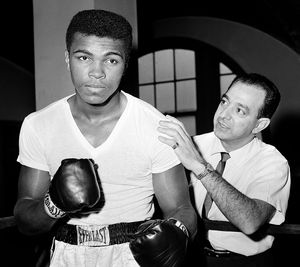Extroverts may age better
If socialization is essential to healthy aging, it makes sense that extroverts -- who tend to thrive in crowds and at parties - would do better in their older years.
A study in the Journal of Research in Personality, as reported at HealthDayNews, "found that for nearly 4,600 British adults followed for decades, those who were 'extroverts' in their youth gave higher ratings to their well-being and satisfaction with life once they'd reached their early 60s."
The researchers were quick to point out that shy people can age well, too. The folks in the study reporting high satisfaction in their 60s were also emotionally stable and "less neurotic" than others in their younger years.
So if you were a neurotic extrovert in your 20s does it cancel out the positive effect in your 60s? Guess I'll have to wait and see.
(S-R archive photo of Muhammad Ali, declared one of history's best known extroverts by Time magazine)
